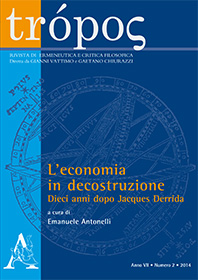Pharmacologie et prolétarisation
DOI:
https://doi.org/10.13135/2036-542X/7708Parole chiave:
tertiary retentions, intentional consciousness, proletarization, positive pharmacology, general organologyAbstract
In this paper we argue that Jacques Derrida opened the way to realize the fundamental role of Husserl’s phenomenology of the consciousness of internal time, yet he did not go through. Since he did not properly examine the transductive relation between intentional consciousness and tertiary retentions, he eventually did not thoroughly understand the essential and inherent technicity of human beings. He also missed the intrinsic plurality of traces at the origin. If for Grammatology it is impossible to become a positive science, we show that it can turn itself into a positive praxis: pharmacology. Such a praxis needs a theory that we call general organology, which has the features of a political economy.
##submission.downloads##
Pubblicato
2014-12-01
Fascicolo
Sezione
Monografica


